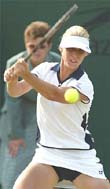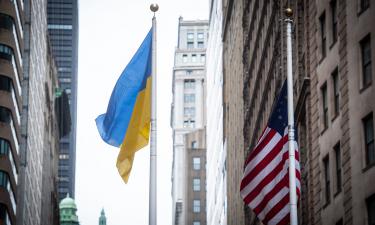Jankovic upsets Dementieva to make first major semifinals
Jelena Jankovic of Serbia advanced to her first Grand Slam semifinals when she knocked out fourth-seeded Elena Dementieva 6-2, 6-1 at the U.S. Open on Tuesday.

Dementieva, the runner-up in 2004, failed to hold serve even once against 19th-seeded Jankovic.
Jankovic notched her third straight win over a top-10 player including No. 7 Svetlana Kuznetsova, the 2004 Open champion, and No. 10 Nicole Vaidisova and will face former champs Justine Henin-Hardenne or Lindsay Davenport.
"I'm so excited to be in the semifinals, it's an amazing feeling," Jankovic said.
She lost to Dementieva in a thrilling, three-set final at Los Angeles less than a month ago, but the contrast to Tuesday's quarterfinal was stunning. The Russian gifted 39 unforced errors and five double faults, often the result of being flustered by Jankovic's fearless strokes and ability to run down shots and return them even harder.
"I didn't expect to win like this but I'm so happy," Jankovic said after the 62-minute outing.
Retiring crossed the mind of the 21-year-old while she was losing 10 consecutive matches from January to May during a comeback from a virus. An admitted bad loser, Jankovic was accustomed to a steadily improving career since she was a junior world No. 1 in 2001.
During her losing streak she began to feel improvement, and her mother Snezana's encouraging presence in Rome spurred her to the quarterfinals. Since then she's won 31 of her last 41 matches, including a final, two semifinals, and two other quarterfinals.
"I appreciate my results a lot more," Jankovic said. "Maybe if I didn't lose 10 matches in a row I wouldn't be in the semifinals here. Maybe I would lose in the second round or something because I would be too loose to kind of care less, in a way."
The semifinals aren't likely to faze someone who, as Dementieva described, was friendly, always laughing, and loud in the locker room. Jankovic was also grounded by second-year studies in economics, political economics and statistics at university by correspondence. The subjects are natural picks; both of her parents are economists.
"I don't want to be a typical tennis player who knows how to hit the forehand and a backhand that's all," she said. "I think this career is quite short and I think there is life after tennis and I need to look after my future," reports AP.
Subscribe to Pravda.Ru Telegram channel, Facebook, RSS!





